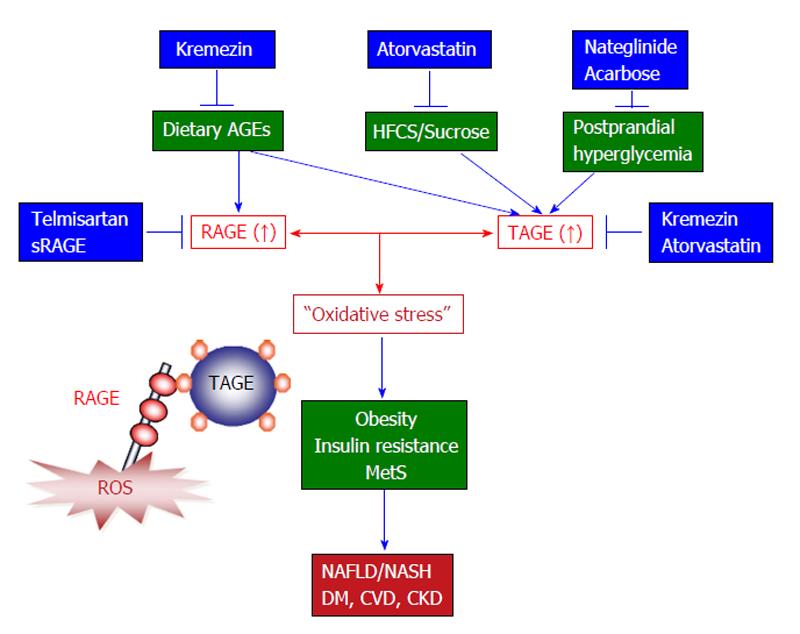Copyright
©2014 Baishideng Publishing Group Inc.
World J Hepatol. Dec 27, 2014; 6(12): 880-893
Published online Dec 27, 2014. doi: 10.4254/wjh.v6.i12.880
Published online Dec 27, 2014. doi: 10.4254/wjh.v6.i12.880
Figure 4 The toxic advanced glycation end-products-receptor for advanced glycation end-products system and novel treatments that target this system to prevent the development and/or progression of non-alcoholic steatohepatitis.
Accumulating evidence suggests that TAGE-RAGE interactions affect intracellular signaling, gene expression, and the release of pro-inflammatory molecules and also induce oxidative stress in numerous types of cells, all of which have the potential to contribute to the pathological changes associated with lifestyle-related diseases including NAFLD/NASH. Since TAGE display the strongest binding affinities for RAGE and have adverse effects on diabetic vessels through their interactions with RAGE, TAGE might be partly responsible for the increased risk of cardiovascular disease (CVD) seen in diabetes mellitus (DM) patients and the impaired glucose tolerance observed in patients with postprandial hyperglycemia. NAFLD is considered to be a hepatic symptom of metabolic syndrome (MetS) and is strongly associated with insulin resistance, obesity, and abnormalities in glucose and lipid metabolism. It is important to consider the amounts HFCS/sucrose and AGEs present in foods to prevent liver disease, particularly in individuals that are at high risk of developing NAFLD/NASH, DM, CVD, or chronic kidney disease (CKD). Taken together, the present study suggests that TAGE could be used as novel therapeutic targets for the prevention of lifestyle-related diseases. Therefore, inhibiting the formation of TAGE, blocking TAGE-RAGE interactions, and suppressing the expression of RAGE or its downstream effectors all have potential as therapeutic strategies against lifestyle-related disease including NAFLD/NASH. AGEs: Advanced glycation end-products; TAGE: Toxic AGEs; RAGE: Receptor for AGEs; sRAGE: Soluble form of RAGE; NAFLD: Non-alcoholic fatty liver disease; NASH: Non-alcoholic steatohepatitis; HFCS: High-fructose corn syrup.
- Citation: Takeuchi M, Takino JI, Sakasai-Sakai A, Takata T, Ueda T, Tsutsumi M, Hyogo H, Yamagishi SI. Involvement of the TAGE-RAGE system in non-alcoholic steatohepatitis: Novel treatment strategies. World J Hepatol 2014; 6(12): 880-893
- URL: https://www.wjgnet.com/1948-5182/full/v6/i12/880.htm
- DOI: https://dx.doi.org/10.4254/wjh.v6.i12.880









